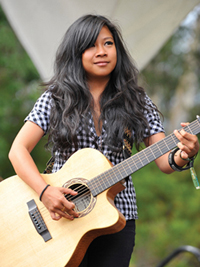What is English? (Part 3)
Activity 2
Have a look at the three passages below. They are all excerpts from poems or songs. Which of them look recognisably like ‘English’ to you? How much can you understand of each of them? (In each case, the original is given first, followed where necessary by a translation into standard British English.)
Excerpt 1
As they was a-ridin’ back to camp
A-packin’ a pretty good load,
Who should they meet but the Devil himself,
A-prancin’ down the road.
Sez he, “You ornery cowboy skunks,
You’d better hunt yer holes,
Fer I’ve come up from Hell’s Rim Rock,
To gather in yer souls.”
Sez Sandy Bob, “Old Devil be damned,
We boys is kinda tight,
But you ain’t a-goin’ to gather no cowboy souls,
‘Thout you has some kind of a fight.”
So Sandy Bob punched a hole in his rope,
And he swang her straight and true,
He lapped it on to the Devil’s horns,
An’ he taken his dallies too.
Excerpt 2
Wark’s dattin a ill-trikkit dug,
Unbiddibil ay, fir aa du roars.
Hit winna byd, hit nivir faetchis.
an du winds up kaain aa.
An luv, wiel hit’s a haaf-wyld kat
Du mebbie maets, bakk an foar.
Hit’ll tak dy kloo an ryv dy sokk,
Till du shæsts da bæst awa.
Naen firby a tøtak’r sænt
Wid aks da pær ta ly tagiddir.
[Work is such a mischievous dog
which never does as it’s told no matter how loud you shout at it
It won’t stay, it won’t fetch, and you end up herding the flock yourself.
And love, well it’s a half wild cat
you feed occasionally.
It makes off with your ball of wool and tears your knitting in pieces
so you chase the creature away.
Nobody except an idiot or a saint
would expect the two of them to lie down together.]
Excerpt 3
So I called and called sampai you answer
You kata “Sorry sayang. Tadi tak dengar.
My phone was on silent, I was at the gym”
Tapi latar belakang suara perempuan lain
Sudahlah, sayang, I don’t believe you
I’ve always known that your words were never true
Why am I with you? I pun tak tahu
No wonder lah my friends pun tak suka you
[So I called and called until you answered
You said, “Sorry darling, I didn’t hear you
My phone was on silent, I was at the gym”
But in the background was another woman’s voice
Enough darling, I don’t believe you
I’ve always known that your words were never true
Why am I with you? I really don’t know
No wonder even my friends don’t like you]
Comment
The first excerpt is from a ‘cowboy poem’ from the Arizona region dating from the early part of the twentieth century by Gail I. Gardner. It tells the story of two cowboys who run into the devil on their way home from a bar. You probably found it almost all intelligible, although there are one or two dialect words (some of them related specifically to their profession) which might be a little obscure. ‘Dally’, for example, refers to a method of winding a rope around the saddle; while ‘ornery’ is originally a colloquial pronunciation of ‘ordinary’, and means ‘cantankerous’ or ‘mean’. There are also a few distinctive grammatical constructions, such as ‘you ain’t a-goin’ to gather no’, which aren’t common in standard English, although similar constructions do still occur in some contemporary colloquial forms of the language.
The second example is in Scots, the traditional Germanic language spoken in Lowland Scotland, the Northern Isles and parts of Ulster. Along with Gaelic and Scottish English, this is one of the three main languages spoken in Scotland. It has its roots in the Anglo-Saxon dialects which arrived on the British mainland in the fifth century, so it’s related to English but has developed mostly independently. Some people consider it to be a dialect of English, while others regard it as an entirely separate language. These stanzas are from a poem called ‘Varg’ by the contemporary poet Robert Alan Jamieson. As you can see, although some words are obviously close cousins of modern standard British English (e.g. ‘wark’ = work; ‘luv’ = love), for the most part it’s quite different. And even these words which sound similar when spoken, are spelt in non-standard ways. It also includes some characters such as ø and æ which aren’t used in modern standard British English. So unless you’re a Scots speaker, you’d probably have difficulty understanding it without the translation.

The third example is from a song titled ‘Kantoi’ by the Malaysian singer Zee Avi. This is in what is colloquially known as ‘Manglish’, a blend of English and Malay. In Malay, this type of language use is also known as bahasa rojak, which means ‘mixed language’. Such mixed or ‘hybrid’ languages are quite frequent around the world. But they’re also often quite controversial, and are viewed by some as being sloppy or incorrect uses of ‘proper English’. In 2006, for example, the Malaysian government banned the use of bahasa rojak on television and radio, saying that it was adversely affecting people’s proficiency in both standard English and Malay (The Star, 2006). On the other hand, many people consider it to be a distinctive aspect of Malaysian culture and, when used in songs such as this, see it as a way of expressing a unique cultural identity.
